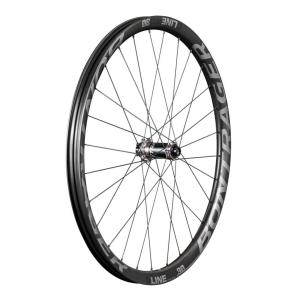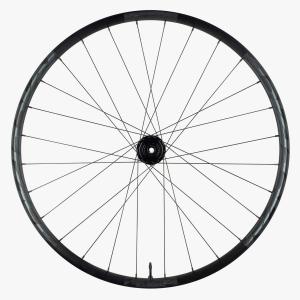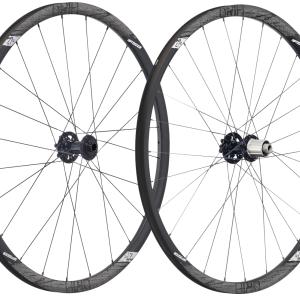FSA Afterburner WideR Wheelset
(discontinued)
| Where To Buy | |||
|---|---|---|---|
Free shipping on orders over $50 (continental U.S. only).
International shipping available. Some exclusions apply. |
|||
Free shipping on orders over $50 (continental U.S. only).
International shipping available. Some exclusions apply. |
|||

The wheelset market is forever getting more and more competitive, especially around the $500-$600 mark. Quality wheels with strong rims and good hubs can be found complete or built at this price point, so anything less than very good will inevitably fail to make much of an impression here. Read on to find out how FSA's new Afterburner WideR hoops held up to our testing.
Strengths
- Straightpull hubs give purposeful look
- Covers most current axle spacing standards
- Comes with tubeless rimstrip (not installed)
- Compliant ride without excess flex
- Fast rolling
Weaknesses
- Graphics stickers seem a little out of place with regards to overall wheel finish
- Requires somewhat less commonplace tools to remove the freehub
- Average engagement
- Rear wheel bearings have started to show signs of roughness after 6 months
FSA Afterburner WideR Highlights
- 1,720g wheelset weight (29-inch)
- Asymmetric rim with 27mm internal width and hookless bead design
- 24 spokes per wheel, two-cross lacing with straight pull hubs
- Optional Torque Caps for use with Rockshox forks
- Shimano or XD driver freehub
- 54-point rear hub engagement with six-pawl system
- Six-bolt rotor mounting
- Tubeless rim strips included (not installed)
- Available in 27.5 and 29-inch sizes (tested)
- MSRP: $629.99 USD
Initial Impressions
Initial unboxing revealed a neutral black finished aspect to the Afterburner wheelset. While the rims themselves have a flat black, orange-peel anodized finish, they are covered pretty heavily with the large shiny sheet style gloss black stickers that take up about half of the rim. While looks don’t necessarily drive everything, especially on components that spend most their time on the ground, it did seem to take something away from the aesthetics of the whole package.


Spinning the freehub by hand gave us a preview of the 54-points of engagement out back, while the straight pull hubs gave a nice, purposeful look to the overall wheel build.


Our test bike is running SRAM Eagle, so out of the box an immediate switch from the factory installed Shimano-style freehub was necessary. The freehub removal and swap will require either cone wrenches or a 12mm allen and an adjustable wrench to remove and reinstall the freehub. This threw us our first little curveball when working off the tailgate of the truck and trying to do a quick wheel swap at the trailhead with a small toolbox at our disposal – take note, you will need these aforementioned items.



Once the freehub was swapped after the proper tools had been acquired, mounting the tires was fairly simple. The included (but not installed) rim tape is pretty stiff and had a few areas that were coming up on the edges after we installed it on both wheels, but our experience with this style of rim tape has been positive regardless of the occasional lifting on the edges and we decided to carry on with no major concerns. Tires were mounted up with tubeless sealant and only the rear had to be “blasted” on with our Specialized Air Tool Blast tire setter to seat the bead. We went with a 2.4-inch Maxxis DHF and a High Roller 2 and the tires looked happy and at home on the 27mm wide rims. Riders looking to run meatier 2.6-inch tires might be a little under gunned in this department so if this is your jam you may want to look for a wider rim to help support a bigger tire and avoid squirm in turns.



On The Trail
During the first spin around the parking lot, the freehub engagement felt adequate at 54-points of engagement per revolution. Nevertheless, call it being spoiled or call it the industry stepping it up on hub engagement, but we have been spending more and more time on snappier hubs recently and expectations have been elevated so we weren’t blown away with the 54 clicks.

Onto the trail, within the first few harder pedal stokes up off the saddle, the hub gave a few unsettling clunks under power. As new hubs break in and get loaded for their first rides, we have found this to happen every now and again, but we instantly backed off after this and put a few more miles into the hub before getting back on it again too hard. Luckily these initial clunks were the most dramatic of the ride, but smaller hub engagement clunks were then experienced again which doesn’t put the warmest feelings in the back of your mind.
**After speaking with FSA we acquired a newly re-designed freehub body that now ships with these wheels. The design change moves to a three bearing system from the original two bearing design, beefing up the freehub to help with the increased torque larger cassettes put on the hub. Once this new freehub was installed we never had another issue with the freehub for the duration of our testing. FSA found a successful fix for the issues we experienced at the start of the test.

Once up to speed and cruising on singletrack, these wheels feel good. Overall ride comfort and wheel compliance has felt true to spec and on par for alloy hoops and we have not noticed any excessive lateral flex. The two-cross lacing pattern has held up to the miles we've put in on the trail and we have not had to play with re-tensioning of spokes after the initial rides like some wheels require – despite the Afterburners making do with only 24 spokes per wheel. We have found that we don’t necessarily get the laser sharp feeling and handling of stiffer (read carbon) hoops, however the wheels feel composed and they track well through high speed brake bumps. They can handle being throwing into corners with quick direction changes and like to roll fast. Boost spacing and asymmetric rim profiles are no doubt a step forward when it comes to stiffness, especially in the 29er category of wheelsets.
After a few rides, we did have to adjust the rear hub bearing preload as it backed off a little leaving us with play in the wheel. This was accomplished fairly easily by backing off the 2.5mm allen screw on the axle lock nut and turning it in by hand to achieve the desired preload.
We have found that we don’t necessarily get the laser sharp feeling and handling of stiffer (read carbon) hoops, however the wheels feel composed and they track well through high speed brake bumps.
We have settled on running around 26psi front and 28psi rear tire pressure and have had good results both with tire sidewall support on our 2.4-inch tires and keeping the rims from getting too beat up on the trail. So far it is all systems go and the rims have taken the abuse and stayed true.
Long Term Durability
Initially, we experienced mechanical issues with the freehub engagement. FSA seems to have solved that issue with the new three bearing freehub body design and we have had no issues since we swapped over. After experiencing the freehub fix which yielded much more positive engagement qualities, we can’t help but wonder if a tighter engagement could also have been possible, offering riders that extra bit of snappiness and control on the cranks for technical riding and when getting on the gas. We can always strive for a little better, right?
The bearings in the rear hub are starting to feel a bit notchy when spun by hand (off the bike) and after multiple bearing preload adjustments and checks, we have not been able to ease off the preload tension without causing noticeable slop in the hub. It makes us wonder how long they will last before needing replacement.
Things That Could Be Improved
Hub maintenance could be a little more simple in the tool department if the rear hub spacer end caps were made with a wider machined wrench flat. This would eliminate the need for specific cone wrenches or a larger 12mm allen for hub work and removal.
In the aesthetics department, we feel the large glossy decals on the rims could be toned down a little to better match the matte anodized finish of the rim surface. This is nit-picky, but could go a ways in the looks department, especially when they start to peel and age with wear and tear.

What’s The Bottom Line?
The FSA Afterburner WideR wheelset comes in at a market price that sees some heavy competition with other complete alloy wheel builds. Overall performance of this wheelset has been good after installing the new updated freehub. Slight bearing degradation in the rear hub bearings has us a little concerned regarding multiple season durability, so we will continue riding them to see how they hold up during some more more miles on the trail. Overall, the Afterburner wheelset has kept us satisfied for an alloy wheelset in this price range.
More information is available at www.fullspeedahead.com.
About The Reviewer
Nick Zuzelski - Age: 32 // Years Riding MTB: 14 // Height: 6'3" (1.90m) // Weight: 185lbs (83.9kg)
Nick began riding motocross at a young age, a sport that would eventually lead him to the world of downhill. As a Colorado native, racing downhill, dual slalom, or a chill dirt jump session was never far away, and he eventually worked his way up the ranks to the Pro level. If a trail has fast flow and some fun gaps, he is grinning ear to ear and getting after it. Living by the assumption that basically everything feels better with a short stem and wide bars, you can count on him keeping it real with a laid back attitude and flat pedals most of the time. Mechanical Engineer by trade, rider by heart, he enjoys riding it, finding out how it works, and making it better.
Photos by Brandon Turman and Nick Zuzelski
Specifications
Includes tubeless valves (1 pair), FSA tubeless tape, and spoke protector
| Where To Buy | |||
|---|---|---|---|
Free shipping on orders over $50 (continental U.S. only).
International shipping available. Some exclusions apply. |
|||
Free shipping on orders over $50 (continental U.S. only).
International shipping available. Some exclusions apply. |
|||


























0 comments
Post a reply to: Tested: FSA Afterburner WideR Wheelset